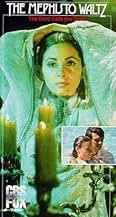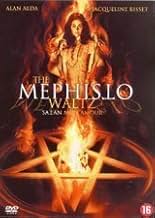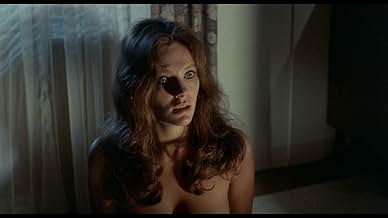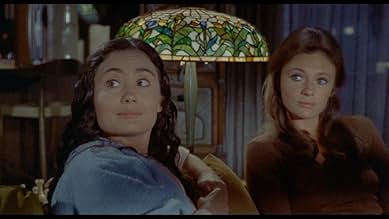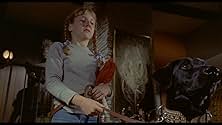IMDb-BEWERTUNG
6,1/10
3452
IHRE BEWERTUNG
Füge eine Handlung in deiner Sprache hinzuAn old, dying satanist arranges to transfer his soul into the body of a young concert pianist.An old, dying satanist arranges to transfer his soul into the body of a young concert pianist.An old, dying satanist arranges to transfer his soul into the body of a young concert pianist.
- Regie
- Drehbuch
- Hauptbesetzung
- Auszeichnungen
- 1 Nominierung insgesamt
Bradford Dillman
- Bill Delancey
- (as Brad Dillman)
Curd Jürgens
- Duncan Ely
- (as Curt Jurgens)
Berry Kroeger
- Raymont
- (as Barry Kroeger)
Terrence Scammell
- Richard
- (as Terence Scammell)
Leon Alton
- Pallbearer
- (Nicht genannt)
Antoinette Bower
- Member of Ely's Group
- (Nicht genannt)
Empfohlene Bewertungen
Whatever moral issues exist in this strange tale of the occult, they vanish as soon as you accept the premise of this story--that a woman would kill another to repossess her husband with both of them in the guise of someone else's body!! It's about as weird as any Tales from the Crypt!
On the plus side, all of it is stylishly photographed and played with a certain amount of relish, at least by Jacqueline Bisset, Curt Jurgens and Bradford Dillman. Biggest flaw is casting Alan Alda in the central role as the pianist who inherits the musical talent of Curt Jurgens when the Satanist dies, bequeathing Alda with his body and soul. Bisset is the wife who slowly comes to suspect that her husband has been taken over by someone else.
Not quite as strikingly original as "Rosemary's Baby", it does have some effective horror moments, notably involving scenes with a rather ferocious black dog and a scene where the Devil is summoned but we never actually see him. Imagination is given free reign here (at least fleetingly), shades of Val Lewton. Perhaps a technique that should have been used more often throughout.
None of it quite makes sense and the ending is a distinct letdown, but there are some chilling moments nevertheless. Bisset and Parkins are beautifully photographed, with Bisset coming out ahead in the acting department, playing the stressed out wife with appropriate fear and tension. Parkins, on the other hand, seems to rely on one frozen expression, sleepwalking through her role, relying solely on her looks to get by in a way that Hedy Lamarr was often accused of doing in films of the '40s.
As for Alan Alda, he is much too bland, lending neither interest nor credibility to a role that demands a strong romantic lead. His career suggests that he is clearly more comfortable in character roles requiring comic flair, not straight dramatic parts. Bradford Dillman is at least a stronger presence in a lesser role.
All in all, not bad for watching when you're in the mood for a tale of the occult. I seem to recall enjoying the book years ago and the film doesn't quite measure up. It emerges as one of those films that could have been much more satisfying with better casting and direction.
On the plus side, all of it is stylishly photographed and played with a certain amount of relish, at least by Jacqueline Bisset, Curt Jurgens and Bradford Dillman. Biggest flaw is casting Alan Alda in the central role as the pianist who inherits the musical talent of Curt Jurgens when the Satanist dies, bequeathing Alda with his body and soul. Bisset is the wife who slowly comes to suspect that her husband has been taken over by someone else.
Not quite as strikingly original as "Rosemary's Baby", it does have some effective horror moments, notably involving scenes with a rather ferocious black dog and a scene where the Devil is summoned but we never actually see him. Imagination is given free reign here (at least fleetingly), shades of Val Lewton. Perhaps a technique that should have been used more often throughout.
None of it quite makes sense and the ending is a distinct letdown, but there are some chilling moments nevertheless. Bisset and Parkins are beautifully photographed, with Bisset coming out ahead in the acting department, playing the stressed out wife with appropriate fear and tension. Parkins, on the other hand, seems to rely on one frozen expression, sleepwalking through her role, relying solely on her looks to get by in a way that Hedy Lamarr was often accused of doing in films of the '40s.
As for Alan Alda, he is much too bland, lending neither interest nor credibility to a role that demands a strong romantic lead. His career suggests that he is clearly more comfortable in character roles requiring comic flair, not straight dramatic parts. Bradford Dillman is at least a stronger presence in a lesser role.
All in all, not bad for watching when you're in the mood for a tale of the occult. I seem to recall enjoying the book years ago and the film doesn't quite measure up. It emerges as one of those films that could have been much more satisfying with better casting and direction.
This 1971 movie is definitely worth seeing, at least for a melancholically superb Jacqueline Bisset (at the same time, the other main character, Alan Alda, offers a lousy and histrionic performance). Even if it may seem obsolete, the movie still gives one chills down the spine at some moments, and the end is maybe a recognition of the fact that Evil is always more tempting than the Good. All in all, the old Faustian theme is well depicted in this movie, with some interesting arabesques (but why do the Satan worshipers speak a terrible French in their rituals - that I do not know, a superb score (naturally, since it is about the world of pianists and music) and some subtle meditations about the condition of the artist today and always. 7/10
Quinn Martin Productions venture into theatrical films as opposed to its television work is a tidy little entry in the Satanic genre which the late 1960s and early 1970s were chock full of and it is sad that we do not see such films today.
The stunning beauty Barbara Parkins and the irrepressible Curt Jürgens steal the show and turn in performances that dwarf the rest of the cast. This is a low budget film and yet without all of today's special effects it is readily more thrilling and frightening than the typical horror film of contemporary American film.
Thank heavens it is on DVD I saw it originally and now eagerly seek to have it for my collection.
The stunning beauty Barbara Parkins and the irrepressible Curt Jürgens steal the show and turn in performances that dwarf the rest of the cast. This is a low budget film and yet without all of today's special effects it is readily more thrilling and frightening than the typical horror film of contemporary American film.
Thank heavens it is on DVD I saw it originally and now eagerly seek to have it for my collection.
At least two people below comment on the frequent appearance of the boom mike in this film. To clarify, that is the fault of the TV company / Video company for screening the film in the wrong aspect ratio. It is not the fault of the filmmakers. If you saw this film in the cinema there would be no boom mike since the top of the frame would be masked off by the lens gate. The TV company is showing you the full frame of the picture which should not be all visible to the audience.
A good plot similar to HP Lovecraft's "The thing on the doorstep" without the "innsmouth look" of Asenath but with the body swapping of devil worshippers attempting an eternal leapfrog through history using others bodies . Violence is kept to a minimum the required evil for this horror is amply supplied by absentee devil who's decadent servants plot and dissemble to increase their own worth , chilling dreams of the blue wax applying witches are the best moments. Alan Alda's performance was believably naive and overshadowed by a masterful and compelling kurt jurgens dry self absorbed and above the pettiness of his guests . Miss Blisset charming, beautiful ."The Ninth gate" , "The night of the demon" may be better films but would happily keep company on the same shelf.
WUSSTEST DU SCHON:
- WissenswertesHas the singular distinction of being the only theatrical film produced by Twentieth Century-Fox during the entire calendar year of 1970, this due to financial reversals incurred by the studio when several of its recent films failed at the box office.
- PatzerAt various points during the film, the demonic potion bottle varies between a clear glass bottle partially filled with blue liquid and a blue glass bottle in which the liquid cannot be seen.
- Zitate
Duncan Ely: People should be born at the age of 70 and live their life backwards.
- Alternative VersionenAn alternate cut of The Mephisto Waltz ran on the Flix network in the early-mid 2000s. This version includes two memorable differences: a much longer floor shot close up of the Doberman's head wearing the Halloween mask, and a shot of Satan's hooves when he visits Paula Clarkson (Jacqueline Bisset) during her Satanic ritual.
- VerbindungenFeatured in Cinemacabre TV Trailers (1993)
Top-Auswahl
Melde dich zum Bewerten an und greife auf die Watchlist für personalisierte Empfehlungen zu.
- How long is The Mephisto Waltz?Powered by Alexa
Details
- Erscheinungsdatum
- Herkunftsland
- Sprachen
- Auch bekannt als
- The Mephisto Waltz
- Drehorte
- Avenue of the Stars, Century City, Los Angeles, Kalifornien, USA(Paula Clarkson walking over bridge in Century City)
- Produktionsfirma
- Weitere beteiligte Unternehmen bei IMDbPro anzeigen
- Laufzeit1 Stunde 55 Minuten
- Farbe
- Seitenverhältnis
- 1.85 : 1
Zu dieser Seite beitragen
Bearbeitung vorschlagen oder fehlenden Inhalt hinzufügen

Oberste Lücke
By what name was Null Uhr fünf - Frauenleiche in der Badewanne (1971) officially released in India in English?
Antwort



